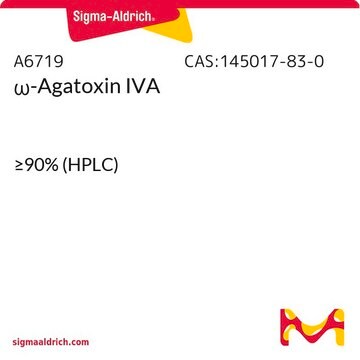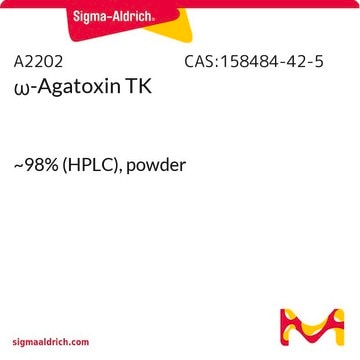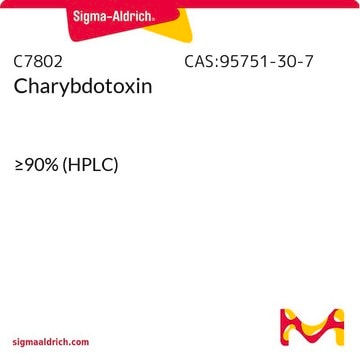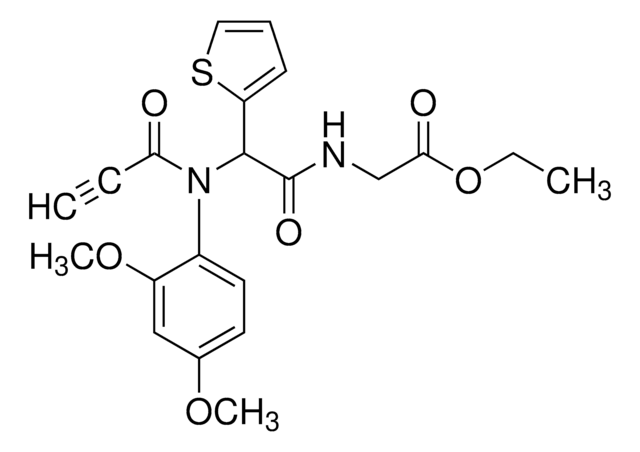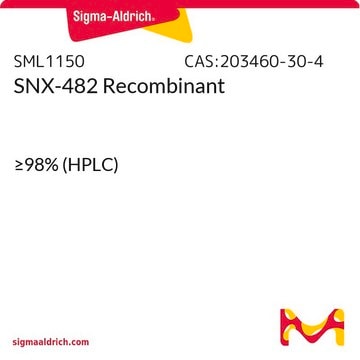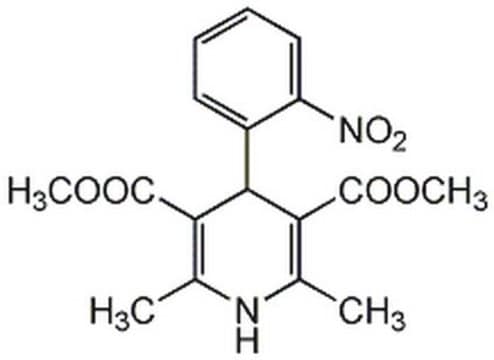All Photos(1)
About This Item
Empirical Formula (Hill Notation):
C120H182N38O43S6
CAS Number:
Molecular Weight:
3037.35
MDL number:
UNSPSC Code:
12352202
NACRES:
NA.32
Recommended Products
Quality Level
Assay
≥97% (HPLC)
form
powder
composition
Peptide content, ~70%
storage temp.
−20°C
Gene Information
human ... CACNA1B(774)
mouse ... CACNA1B(12287)
rat ... CACNA1B(257648)
Looking for similar products? Visit Product Comparison Guide
Amino Acid Sequence
Cys-Lys-Ser-Hyp-Gly-Ser-Ser-Cys-Ser-Hyp-Thr-Ser-Tyr-Asn-Cys-Cys-Arg-Ser-Cys-Asn-Hyp-Tyr-Thr-Lys-Arg-Cys-Tyr-NH2 [Disulfide Bridges: 1-16, 8-19, 15-26]
Application
ω-Conotoxin GVIA has been used as an antagonist for N-type calcium channel (CaV2.2) in various studies.
Powerful probe for exploring the vertebrate pre-synaptic terminal.
Biochem/physiol Actions
ω-Conotoxin GVIA is a 27 amino acid neurotoxin containing three disulfide bonds. It inhibits central neurotransmitter release and also exhibits antihypertensive, analgesic and neuroprotective activities.
Blocks specific voltage-dependent N-type Ca2+ channels in neurons, but not in muscle; does not bind to either the dihydropyridine or verapamil binding sites; peptide first isolated from the marine snail Conus geographus L.
Other Notes
Lyophilized from 0.1% TFA in H2O
Storage Class Code
11 - Combustible Solids
WGK
WGK 3
Flash Point(F)
Not applicable
Flash Point(C)
Not applicable
Personal Protective Equipment
dust mask type N95 (US), Eyeshields, Gloves
Certificates of Analysis (COA)
Search for Certificates of Analysis (COA) by entering the products Lot/Batch Number. Lot and Batch Numbers can be found on a product’s label following the words ‘Lot’ or ‘Batch’.
Already Own This Product?
Find documentation for the products that you have recently purchased in the Document Library.
Precursor structure of omega-conotoxin GVIA determined from a cDNA clone
Colledge CJ, et al.
Toxicon, 30(9), 1111-1116 (1992)
Inhibition of central neurotransmitter release by omega-conotoxin GVIA, a peptide modulator of the N-type voltage-sensitive calcium channel
Dooley DJ, et al.
Naunyn-Schmiedeberg'S Archives of Pharmacology, 336(4), 467-470 (1987)
C J Herrero et al.
British journal of pharmacology, 127(6), 1375-1387 (1999-08-24)
Rat alpha3beta4 or alpha7 neuronal nicotinic acetylcholine receptors (AChRs) were expressed in Xenopus laevis oocytes, and the effects of various toxins and non-toxin Ca2+ channel blockers studied. Nicotinic AChR currents were elicited by 1 s pulses of dimethylphenylpiperazinium (DMPP, 100
Crotoxin from Crotalus durissus terrificus snake venom induces the release of glutamate from cerebrocortical synaptosomes via N and P/Q calcium channels
da Silva Lomeo R, et al.
Toxicon, 85(1), 5-16 (2014)
CaV2. 2 gates calcium-independent but voltage-dependent secretion in mammalian sensory neurons
Chai Z, et al.
Neuron, 96(6), 1317-1326 (2017)
Our team of scientists has experience in all areas of research including Life Science, Material Science, Chemical Synthesis, Chromatography, Analytical and many others.
Contact Technical Service